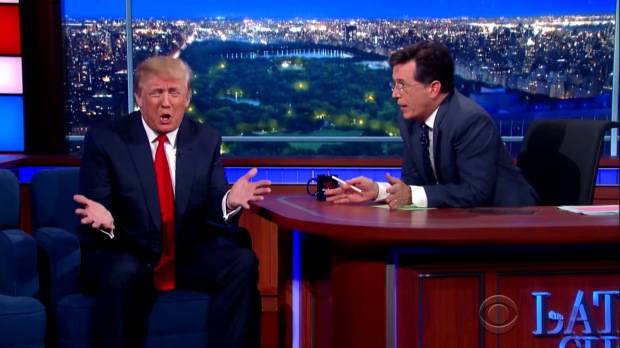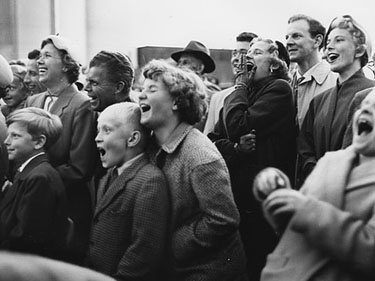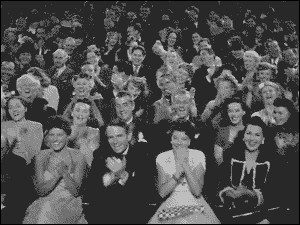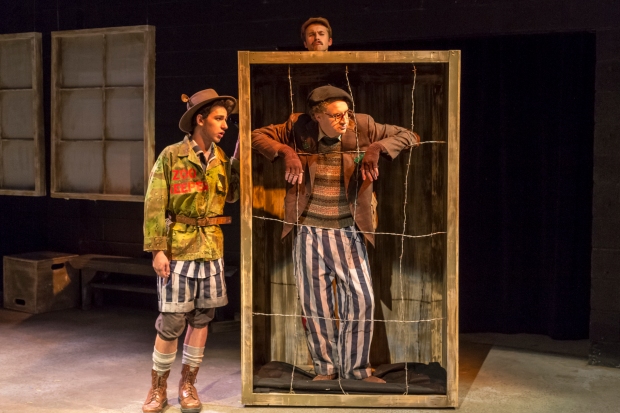Comedy, Tragedy and the Rise of Trump
Since Donald Trump became the presumptive nominee of the Republican Party for President of the United States in early May , pundits and commentators have attempted to understand how this once unthinkable scenario came about. In fact, since his strong showing in the Iowa caucus this winter, people have tried finding the culprit for the rise of the reality television personality.
The old saying claims success has many fathers while failure is an orphan. In the case of Trump, however, it seems the failure of the political system has many fathers. During the past months President Obama has been blamed for the rise of Trump, so has the Republican Party, so has income inequality, and racism, and political science. The most usual suspect, however, remains the media. The case has been made that the media, and television especially, gave Trump unlimited airtime to peddle his particular brand of racism, xenophobia, nationalism, and conservatism. Leslie Moonves, executive chairman of CBS, articulated the relationship between media and Trump when he admitted that “it may not be good for America, but it’s damn good for CBS”.
The lavish media attention given Trump includes late-night comedy, the former Apprentice host has appeared on all three network’s late-night shows, and even hosted an episode of Saturday Night Live on NBC. Showbiz politics is nothing new in American politics; celebrity has been a part of presidential elections for decades as historian Kathryn Cramer Brownell has shown. I have previously written on this blog about late-night campaigning and how integral comedy has become to presidential communication. What makes the appearance of Donald Trump on Saturday Night Live for example so controversial, however, is that his statements are far outside the political mainstream. Balancing the quest for ratings with the risk of normalizing the rhetoric of Trump, while keeping the comedic integrity, has made for very different late-night appearances.

Donald Trump on the Late Show with Stephen Colbert in September 2015.
Laughing with Laugh Tracks

Teaching American Humor: Laughing with Laugh Tracks
My life would be better with a laugh track. My writing would be better, too. So would your reading experience–well, with a laugh track and a few drinks…
I am with the majority opinion on this issue, at least according to most producers of American situation comedies for the last sixty years. The reasoning behind the laugh track, as I see it, goes like this: A laugh track makes people laugh; people who laugh enjoy situation comedies; people who enjoy situation comedies see plenty of commercials; people who see commercials while in a good mood tend to buy things; a laugh track makes people laugh, and so on… Those who buy and sell commercials fund sitcoms, and they have never been inclined to trust writers or audiences. Neither do I.
I have skillfully written two first-rate jokes thus far. But, of course, you can’t really know that because this post does not have a laugh track. I spent several hours trying to insert laugh track audio here and failed. That’s funny–I think–but how can any of us be sure?

Teaching the American sitcom requires some discussion of laugh tracks. I admit that I have only glossed over laugh tracks in courses on American humor thus far. This has been a mistake. I have awakened to an obvious point: laugh tracks provide a compelling way for students to consider a more challenging array of characteristics of the art form–from the aesthetic to the mundane, from the heart of performance to the mechanics of production, from the implicit honesty of comedy to the manipulative potential of technology. From now on, I will begin all coursework focused on the sitcom with the laugh track.
Here is how I came to this astounding awakening; it’s all about The Big Bang Theory. I like the show (though I can’t decide whether I should consider it a “guilty pleasure” or an appreciation of solid, if broad, writing). The laugh track, however, drives me crazy. It is loud and intrusive. I don’t believe it at all. I am not alone. Any quick Google search of “laugh tracks” will provide over 31,000,000 hits. Type in “Big Bang Theory,” and you will find 127,000,000 hits, virtually all of which refer to the show (I didn’t check out all of them, by the way. I simply reached that conclusion using the scientific method based on my observations of the first two pages). Here is a fact: lots of people care about the television show; almost nobody cares about the scientific theory. A search of the show title combined with “laugh tracks” gets 181,000 hits. Lots of people hate the laugh track (lots of people hate the show, too). YouTube has plenty of clips of the show with the laugh track removed. Here are two examples:
http://www.youtube.com/watch?v=PmLQaTcViOA
http://www.youtube.com/watch?v=ASZ8Hks4gko
These clips draw out two basic responses from interested parties: one, that the show is hurt by the laugh track (so the complaint concerns its use rather than the inherent quality of the show itself); two, that the laugh track lamely attempts to cover up a lousy show. There is no reconciling of these opposing positions, but the removal of the laugh track is disingenuous in that it creates a show wherein the comedic timing has been wholly distorted. The Big Bang Theory is filmed in front of a live audience, and the performance reflects the interaction between audience and cast. The producers of the show claim that the audience responses are genuine and have not been “sweetened,” a term to imply that the laughter has been engineered in production to enhance audience responses. This claim is disingenuous as well. Any production process will inevitably “sweeten” the final product–from placement of microphones to volume applied. All steps in the process of preparing a show for airing are a form of “sweetening.” Simply because the producers do not use canned laughter (laughter recordings NOT from an live audience) does not mean that no laughter manipulation occurs. Of course it does. As always, The Onion provides the best satirical take on laugh tracks with the show by simply raising the volume of the laugh track so that it wholly overpowers the show itself: Big Bang Theory with laugh track enhanced by The Onion
Comedy Above All Else: On Directing The Last Cyclist
By Rachel E. Blackburn
One of my all-time favorite Seinfeld episodes featured the dentist character Tim Watley, played by Bryan Cranston. Watley begins making Jewish jokes after a recent conversion to Judaism. Seinfeld discovers this, is clearly bothered by it, and in response, visits one of Watley’s fellow patients, Father Curtis (sitting in a confessional booth to do so). After Seinfeld shares with Father Curtis the humorous antics of Watley, Father Curtis asks Seinfeld, “And this offends you as a Jew?” And Seinfeld responds, “No, it offends me as a comedian.” As one who was raised Jewish myself, complete with Bat Mitzvah, years of Hebrew school and the requisite trip to Israel, I always secretly revered that statement, however silly it may be. I might go so far as to say I found it admirable and noble; all hail in the name of laughter! I readily identified with the notion that Seinfeld ultimately held his identity as a comedian closer to his heart than that of his ethnic and cultural heritage.
The opportunity came to test my commitment to comedy above all, however, when I recently co-directed (with Ms. Gina Sandi-Diaz) a play titled The Last Cyclist. The Last Cyclist, written by Karel Svenk, is a comedy borne out of the Holocaust; specifically, written and rehearsed inside Theresienstadt, one of many concentration camps in operation roughly from 1940 – 1945 during WWII. What sort of authorial voice do we have in Karel Svenk, who in the midst of starvation, degradation, torture and dehumanization, found the energy and inspiration to write a comedy? What might he have to laugh about in his given circumstances? And, beyond all this – how did I approach directing such a piece nearly seventy years later after its initial conception?

Karel Svenk, the man who found the motivation and enthusiasm for laughter despite everything, was a Czech prisoner. What little we know of Svenk – a comedian, actor, and playwright – was that he was charismatic, funny, goofy in the best of ways, and inspiring to his fellow prisoners. Naomi Patz, who has reconstructed and reimagined his work (the script adaptation of The Last Cyclist which I directed in the theatre), has often stated in her discussions of Svenk that he was something akin to a European Charlie Chaplin, in terms of his physical comedy. Were he to be alive today, she says, we might read him as analogous to a Robin Williams: someone whose manic energy was infectious, and could somehow shine light in even the darkest of corners. Svenk was someone who could readily demonstrate for us the value of comedy as a tool for overcoming the worst cruelties of life, in the skillful manner of a true artist and comedian.[1]
When Archie Met Sammy
I recently stumbled across a very entertaining and thought provoking list of 100 jokes that shaped modern comedy. The article is a fun read, and if you take the time to watch the video clips it is a good way to spend your entire weekend. As a scholar working on the intellectual history of the 1970s sitcom All in the Family, I was happy to see the show represented on the list. The joke representing the sitcom was from the classic episode Sammy’s Visit (originally aired February 19, 1972 on CBS), in which Sammy Davis Jr. forgets his briefcase in Archie Bunker’s (Carroll O’Connor) cab and comes to pick it up from his home on 704 Hauser St.

Archie: Now, no prejudice intended, but, you know, I always check with the Bible on these here things. I think that, I mean if God had meant for us to be together, he’d-a put us together. But look what he done. He put you over in Africa, and put the rest of us in all the white countries.
Sammy Davis Jr.: Well, he must’ve told ’em where we were, because somebody came and got us.
The joke managed to not only dress down Archie, but make a direct link between slavery and the continuing bigotry in America. The issue of Archie as a “lovable bigot”, a term used by Laura Z. Hobson to criticize him six months earlier in the New York Times, was also addressed head-on in the episode. The Bunker’s black neighbor Lionel Jefferson (Mike Evans) tries to explain Archie to their guest.
Lionel: But he’s not a bad guy, Mr. Davis, I mean, like, he’d never burn a cross on your lawn.
Sammy: No, but if he saw one burning, he’s liable to toast a marshmallow on it.
The episode is widely considered one of the most memorable sitcom episodes, and was ranked 13th on TV Guide’s 1997 list of the “100 Greatest TV Episodes of All Time”. Yet, the episode almost did not come to be. When Davis guested the Tonight Show with Johnny Carson in the spring of 1971, some months after the premiere of All in the Family, he lauded the new, controversial show and introduced the idea of himself guest starring on it. Norman Lear, the creator of the show, and John Rich, the director for the first four seasons, both agreed that wasn’t going to happen but appreciated the kind words and welcomed the promotion. Davis, however, kept pushing the idea. His manager tried to convince Lear and Rich, while Davis himself told the press a guest spot was in the works. Finally, Lear and Rich bowed to the inevitable and set about to find a way to incorporate the star into the show.
It was the writer Bill Dana who came up with the idea of Archie encountering Davis while moonlighting as a cab driver. Carroll O’Connor described the episode as a fun adventure but at the same time noted that it was atypical, being mostly “gags and jokes” and not “applicable” to anything broader the way All in the Family shows usually were. John Rich and Norman Lear, both pleased with the episode, also vowed never to do another celebrity guest episode. The show is great fun and ends with Davis kissing Archie on the cheek, as they are posing for a photograph. It is unclear whether Dana or Rich, who both claim credit, came up with that iconic television moment, which received what Rob Reiner called one of the longest laughs in history.

A final note to the story of when Archie met Sammy: Bill Dana, who wrote the show, was highly praised and perceived to be the favorite for an Emmy. As it happened, however, his agent’s secretary mistakenly sent the necessary paperwork to the Writer’s Guild instead of the Television Academy. Without even receiving a nomination, Dana watched as the show took home ten awards, including Outstanding Directing for Sammy’s Visit. There is a humorous side to such a silly mistake costing Dana, a comedy legend in his own right, an Emmy, though I doubt he saw it that way.
The Comedy of the Black Republican
While I am currently working on political ideology on entertainment television in the 1970s, I do enjoy watching more contemporary television as well. Often, however, I am struck by how apolitical network television entertainment today is compared to the 1970s. In fact, the 1970s constitute a very peculiar period in network television. Especially comedies reveled in a new politically relevant humor, and the ratings ensured them leeway. But by the 1980s, the proliferation and weight of a wide array of interest groups had hampered the comedic freedom. Modern Family recently spent a story arch on Claire (Julie Bowen), one of the main characters, running for city council. Yet, her partisan alignment was never identified. This tactic is quite common in an industry that strives for as wide an audience as possible. There are few, if any, upsides in offending parts of your audience with partisan identification.
This is why I was so surprised to come across an episode of the ABC sitcom Black-ish revolving entirely around the idea of the Black Republican. The episode starts with Dre (Anthony Anderson) stipulating facts of life, including:
“Black people aren’t Republicans, we just aren’t. We vote for Democrats. And it’s not just an Obama thing […] black people also overwhelmingly backed this guy [photo of Dukakis in a tank], this guy [photo of Al Gore kissing Hillary Clinton], hell 91% of black people voted for this guy [photo of Walter Mondale holding boxing gloves]. Fact: 91% of Walter Mondale’s family didn’t vote for Walter Mondale. Sure, the other side may trot out a token black face every now and again, but the fact of the matter is being a black Republican is something we just don’t do.”
The show often deals with perceived cultural differences between black Americans and white Americans, Continue reading →
Happy Birthday, Samuel Langhorne Clemens. Not you, Mark Twain.
Tracy Wuster
November 30, 2015 will be celebrated as the 180th birthday of one Mark Twain—novelist, humorist, and all around American celebrity. I, for one, will not be celebrating.
You see, I recently finished up a book about Mark Twain, and I know, for a
fact, that Mark Twain was born on February 3,  1863. Or thereabouts. No one knows for certain, but that is as certain as we can be, so that is enough. And not so much born, but created, or launched…inaugurated…catapulted…
1863. Or thereabouts. No one knows for certain, but that is as certain as we can be, so that is enough. And not so much born, but created, or launched…inaugurated…catapulted…
That means that this February 3, 1863 will be Mark Twain’s 153rd birthday, which is not that fancy of a number, but it is getting up there for someone still so famous as to have people writing books about him—and more importantly, people reading books by him.
Sure, everyone knows that “Mark Twain” was really the pseudonym of Samuel Langhorne Clemens. Even early in his career, almost everyone knew that, often using the names interchangeably, as most Americans still do. Not as many people know the names Samuel Clemens used an abandoned before creating Mark Twain: “Grumbler,” “Rambler,” “Saverton,” “W. Epaminondas Adrastus Blab,” “Sergeant Fathom,” “Quintus Curtis Snodgrass,” “Thomas Jefferson Snodgrass,” and “Josh.” Selecting “Mark Twain” was clearly a wise choice, although the name would have had a second, nautical meaning for many nineteenth century folk.
Samuel Clemens mixed up the use of his given name and his chosen name—making the whole distinction a mush of confusion that is either a bonanza of psychological material or, alternately, meaningless. For most people, I would guess the distinction is meaningless trivia, which is fine. I’m just happy people still know and read books by Mark Twain. But, I for one, will still grumble when people wish Mark Twain a “Happy Birthday” each November 30th, and I will still try to correct them by pointing out that the “Mark Twain” they refer to really was born—or created—on February 3rd, 1863.
But what does it matter?
Late-Night Campaigning: Presidential Elections and Late Night Television
Since the days the Toast of the Town and the Texaco Star Theater late-night talk shows have, under the guidance of television legends like Johnny Carson, Dick Cavett, and Merv Griffin, evolved into a humor institution in the United States. Late-night talk shows enjoy a very public and influential position in American life, which is why controversies within the subject have such a significant news value. When Carson, the King of Late Night, quit the choice of replacement caused a rift between Jay Leno and David Letterman that was covered by the press and actually resulted in a HBO film adaptation. Some two decades later, when Leno asked for his show back months after retiring and handing the show over to Conan O’Brien, the fight was again fought out in public. Given their roles as the nation’s public humor institutions, late-night talk shows are also attractive for presidential candidates hoping to form their image in a light setting.
Back in 2012 President Barack Obama joined Jimmy Fallon on the Tonight Show for an interview and a segment called Slow Jam the News, where he recited news while Fallon provided comedic commentary and his house band The Roots provided a smooth musical soundtrack. The appearance was hailed by the audience but criticized by conservative commentators. Gretchen Carlson on Fox News lamented how the appearance “lowers the status of the office” and called it “nutso”.
Similarly, when Obama recently visited Jimmy Kimmel Live! he participated in one of the show’s most popular comedy segments: Mean Tweets. The bit is very simple, a celebrity reads actual negative messages directed at them on Twitter while Everybody Hurts by R.E.M. plays in the background. While the appearance was incredibly popular, drawing millions of views on YouTube, some found it unworthy of the presidency.
When will we get a President who is more like a behind the scenes CEO and not a megalomaniacal elected dictator obsessed with fame and public image?”
Yet late-night television appearances have long been a part of the political sphere. Going back to 1960, both John F. Kennedy and Richard Nixon visited Jack Paar on the Tonight Show. Ronald Reagan appeared on The Tonight Show with Johnny Carson in the run-up to his campaign to unseat Gerald Ford as the Republican nominee in 1976. When Bill Clinton came on The Arsenio Hall Show and showed off his saxophone talent, political commentators accused him of demeaning the presidency, yet the appearance came to shape his image as a relatable leader. The same quality helped George W. Bush 8 years later, as he showed off his folksy side in late-night chats.
Like it or not late-night television is an appreciated domain for politicians seeking or holding the highest office. This has been especially clear this autumn as the race for the 2016 election is moving into high gear. Since the end of August a presidential contender has appeared on one of the main late-night talk shows a total of 14 times (as of October 28, 2015). The number can be viewed as both high (roughly every third night of late-night, there is a candidate campaigning) and low (when combining the Democratic and Republican fields the candidates, including the ones who have now dropped out, exceed twenty). There is clear patterns visible in these appearances; the bulk of them are on Stephen Colbert’s new Late Show (5) or Comedy Central’s two late-night shows (3). Neither James Corden nor Conan O’Brien have hosted any candidates this fall and Kimmel has only had Bernie Sanders on. It is clear that Colbert is staying with what he knows and is making his domain one far more political than his late-night competition (besides the presidential candidates he has hosted the First Lady, Secretary of State John Kerry, Senators John McCain and Elizabeth Warren, and even Supreme Court Justice Stephen Breyer). Despite the far broader Republican field they have only one more appearance on late-night thus far this autumn, with five candidates appearing twice; Secretary Hillary Clinton, Governor Martin O’Malley, Senator Bernie Sanders, Governor Chris Christie, and of course Donald Trump.
With the exception of the late-night veteran Trump, the only candidate from the conservative wing who has entered the lion’s den is Senator Ted Cruz. For late-night remains a space that can be uncomfortable for conservatives, and indeed Cruz was booed by the studio audience for his conservative views. Stephen Colbert pleaded with the audience to show Cruz respect as an invited guest and has taken decisive steps for partisan balance among his guests. But it is clear that the arena is far more risky for conservative candidates than moderate or liberal ones.
For more commentary on the 2016 elections, check out the interdisciplinary election podcast Campaign Context at www.campaigncontext.wordpress.com.
Stephen Colbert and Poetry
This week two of my friends went to see a taping of The Late Show with Colbert and came back impressed. My friend Steven Smith has interviewed Colbert and said he’s a nice guy. I like Stephen Colbert, too––for lots of reasons. Among them, he likes poetry.
Billy Collins explains what it means to be U.S. Poet Laureate.
Elizabeth Alexander explains the difference between a metaphor and a lie.
MoMA’s Poet Laureate Kenneth Goldsmith discusses his book.
 Saul Williams describes slam poetry.
Saul Williams describes slam poetry.
And finally, though she’s a patron of poetry, not a poet, Caroline Kennedy talks about her book, “Poems to Learn by Heart.”












